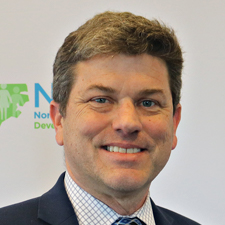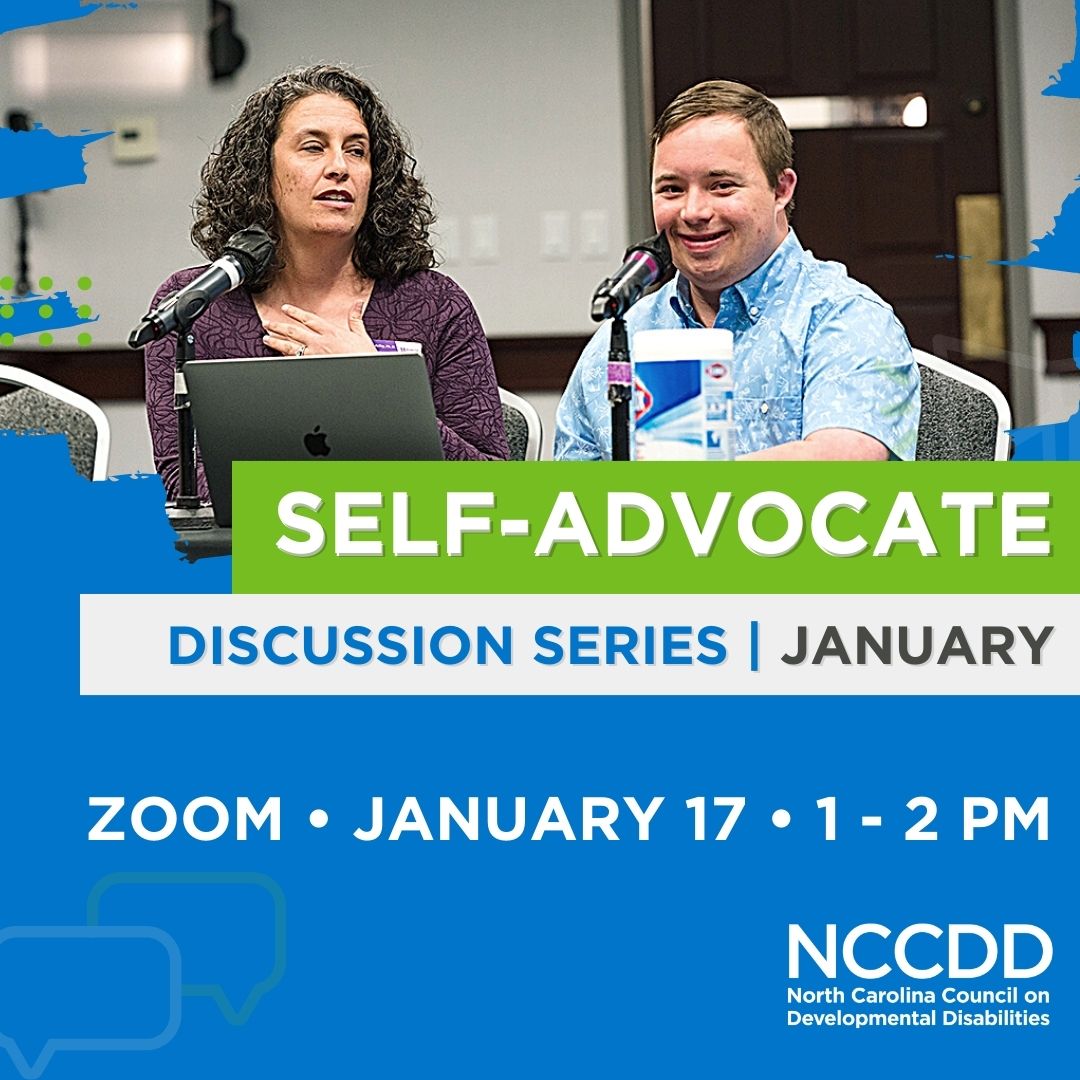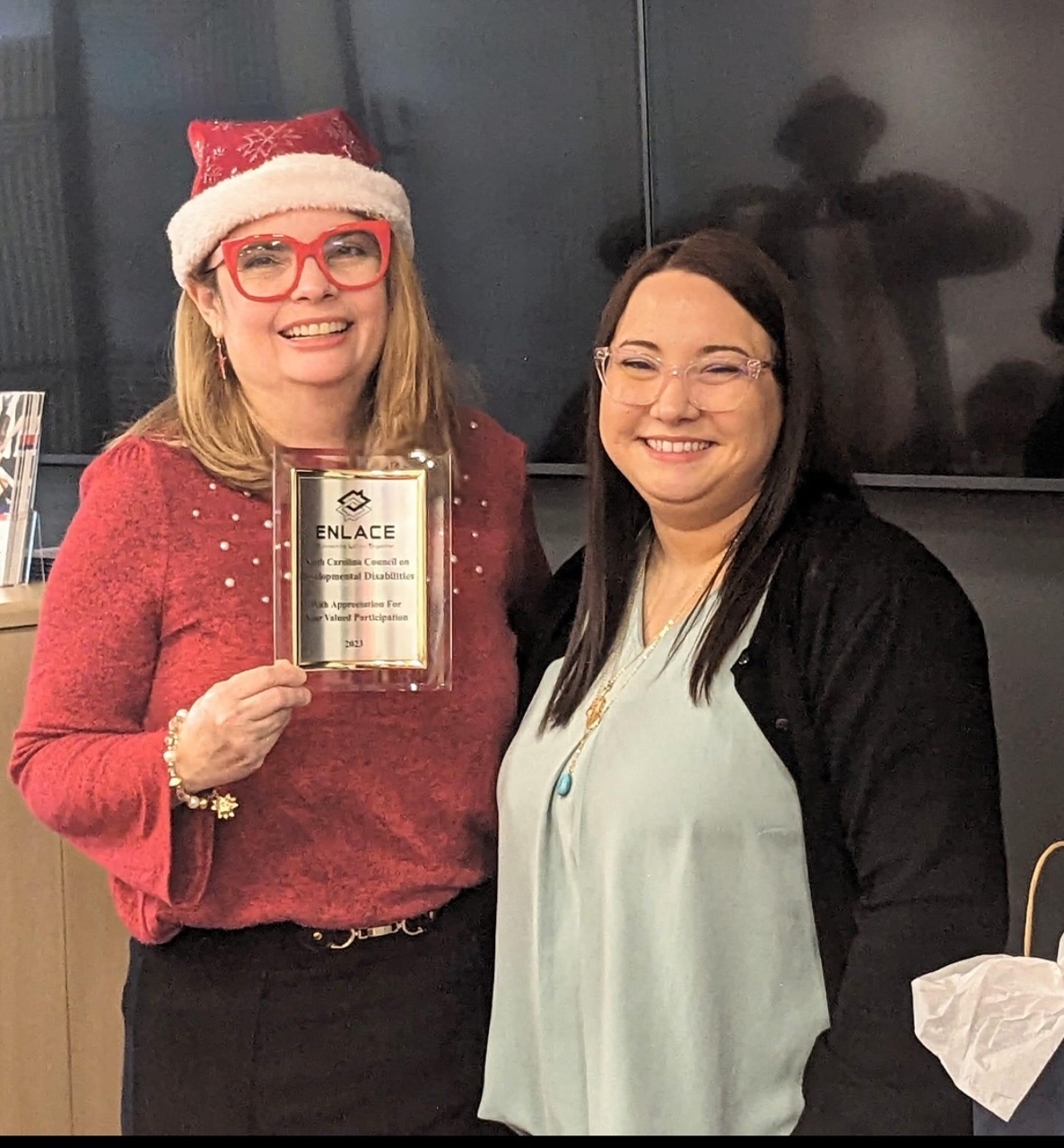December 2023 Highlights and Hot Topics
- Letter from the Executive Director
- Public Policy (as of December 19, 2023)
- January Self-Advocate Discussion Series: Emergency Preparedness
- Hispanic Outreach: NCCDD Recognized by ENLACE
- Happy Holidays from all of us at NCCDD!
- En Español - diciembre 2023
- Audio - Highlights and Hot Topics
Letter from the Executive Director

To end the year and prepare for 2024, Council Chair Bryan Dooley shares this excerpt from a speech he gave to the Olmstead Planning Stakeholder Advisory Committee (OPSA) on December 15, 2023. Bryan is the co-chair of OPSA.
Olmstead Planning Stakeholder Advisory Committee Speech
Presented by Council Chair Bryan Dooley
I live the fight to implement the Olmstead Decision every single day of my life. My work at Solutions for Independence is supporting people with disabilities to live in their own communities.
This fight is personal. In 2021, I lost my mom to an aggressive form of cancer. She had been my primary caretaker. Through the COVID-19 pandemic and the first year after mom's death, I mainly had one paid Direct Support Professional (DSP) who worked with me for 12 to 14 hours a day. This heroic effort kept me in my home and community and gave me competitive integrated employment opportunities for the first time. The most my DSP made was 15 dollars an hour, with no benefits.
 Council Chair Bryan Dooley and Executive Director Talley Wells
Council Chair Bryan Dooley and Executive Director Talley Wells
There came a time when he was forced to seek another job. It is a ubiquitous experience in life with a disability to lose DSPs and to try to develop new ones.
Until my provider could get a team together, I had to stay with my family in Salisbury. This was difficult because my grandparents are aging, there is no accessible bathroom, and it is far from my work.
Through very hard work, I was able to keep my job. There were many setbacks along the way, but on August 18, I moved back home.
We must move from rousing speeches to action. Let us implement an Olmstead plan in such a way that everyone with a disability in the Tar Heel state can live their best lives in the homes and the communities they choose, just like me.
As we close out the year, I want to say thank you for the progress we made but also recognize how far we have to go. The good news is we achieved a significant increase in DSP rates, new funding for employment, Medicaid expansion, and the new 1915(i) Medicaid service. But we unfortunately still have a 17,000-person waiting list, a workforce shortage, and a need for a lot more housing.
Many other states don’t have waiting lists. Our state has one that takes over ten years!
My challenge for us in 2024 is to make sure OPSA is making a difference with measurable progress. Let’s also make sure whoever is our next Governor makes Olmstead his or her priority.
Talley Wells, Executive Director
Public Policy (as of December 19, 2023)

STATE
Legislature
The short session will begin on April 24, 2024. The short session allows legislators to review and adjust the state’s two-year budget that was adopted the previous year. During the short session, lawmakers may only consider new legislation that impacts the budget or bills that passed during the long session. Two areas of particular interest for people with intellectual or other developmental disabilities (I/DD) from the previous budget were the 350 Innovations waiver slots and the $60 million for increasing direct support professional (DSP) salaries. Both items address critical areas but fall short of what is needed. The short session is an opportunity to continue education and advocacy around the need for more Innovations waiver slots and the additional funds needed to increase DSP rates to at least $18 an hour.
The NC Department of Health and Human Services (DHHS) will also focus on provider rates during the short session in an on-going effort to ensure rates keep up with inflation as we move forward. Other areas of focus for DHHS during the upcoming session include reviewing and consolidating recent legislative changes, strategic use of state dollars for the NC Mental Health, Developmental Disabilities, and Substance Use Services (MH/DD/SUS) system, and consistent management of the Innovations waiver waitlist.
Local Management Entity/Managed Care Organizations (LME/MCOs) Consolidation
Vaya) is underway. There is an agreement on the consolidation of Sandhills, Eastpointe, and Trillium. On December 18, DHHS Secretary Kody H. Kinsley approved the consolidation agreement between Trillium Health Resources and Eastpointe Human Services, which provide managed care services to North Carolina’s Medicaid population. This approval includes the consolidation of Eastpointe and Sandhills Center. Joy Futrell, CEO of Trillium Health Resources will be the CEO of the consolidated entity. Effective January 1, 2024, there will be a total of 46 counties in the combined region that will now be operated by Trillium. For members and providers, the consolidation transition will occur on February 1, 2024. DHHS will send notices to all transitioning members in early 2024, and they will receive welcome packets from Trillium after that time. There will be provider information sessions to answer questions and provide necessary information.
FEDERAL
Budget and Appropriations
On November 16, 2023, President Biden signed the continuing resolution (CR) (H.R. 6363), avoiding a government shutdown for a second time. A CR continues last year’s funding at the prior levels while Congress works to complete the process for funding the federal government for Fiscal Year 2024 (FY24). The CR contains two different dates for when it expires. It expires for agencies covered by the Agriculture, Energy-Water, Military Construction-VA and Transportation-HUD bills on January 19, and expires on February 2, 2024 for the other eight bills, including the Labor-Health-Human Services-Education-Related Agencies (LHHS) bill (H.R. 5894).
Congress is still working to pass all the budget bills before the deadlines. The Senate has passed three of the 12 annual spending bills, while the House has passed seven spending bills, but the chambers provide vastly different funding levels for federal programs.
The Senate worked in a bipartisan fashion to draft FY24 spending bills to the limits agreed to in the Fiscal Responsibility Act of 2023 (FRA) which imposes strict spending limits on annual appropriations through FY25. To bolster needed funding, senators also agreed to an additional $14 billion in supplemental funds designated as “emergency spending,” providing additional funding while also technically abiding by the conditions of the FRA. House Republicans, meanwhile, interpreted the limits established in the FRA as a “ceiling, not a floor” for spending cuts, and pushed for even steeper cuts to federal programs. To pass a final spending bill, Congress will need to bridge the divide and reach a bipartisan, bicameral agreement on funding levels.
There are now some members of Congress pushing for a year-long Continuing Resolution which could eliminate the $14 billion in emergency spending provided by the Senate, resulting in even deeper spending cuts than would be provided under a final FY24 spending bill that adheres to the terms of the FRA.
Congress needs to hear what cuts to the budget would mean for people with disabilities.
Mental Health Justice Act
On November 16, 2023, Representatives Katie Porter (D-CA-47) and 48 other Representatives introduced the bi-partisan Mental Health Justice Act (H.R. 6451). The bill aims “to reduce the killing and incarceration of people with mental illnesses, substance use disorders, and intellectual or developmental disabilities, and instead connect them with the health care and services they need.”
The bill will establish grant programs for state and local governments to hire, train, and dispatch mental health professionals instead of law enforcement officers in emergencies involving a person experiencing a mental health crisis; allow the Civil Rights Division at the U.S. Department of Justice and the Substance Abuse and Mental Health Services Administration at U.S. Department of Health and Human Services to provide technical assistance to grant recipients; require a study on the effectiveness of the grant program; and create and disseminate resources for best practices for mental health professionals responding to mental health emergencies.
January Self-Advocate Discussion Series: Emergency Preparedness
 Get ready for another year of NCCDD's popular Self-Advocate Discussion Series! And “get ready” is the focus of the January discussion: Emergency Preparedness.
Get ready for another year of NCCDD's popular Self-Advocate Discussion Series! And “get ready” is the focus of the January discussion: Emergency Preparedness.
On January 17, 2024 at 1PM, come learn about a program that is inclusive of persons with intellectual or other developmental disabilities (I/DD) and that builds capacity for disaster preparation, emergency response, and related procedures and systems. Join us as we revisit the NC Emergency Management and NCCDD’s Emergency Preparedness Initiative based on June Kailes’ Function Based Framework for Emergency Management and Planning and learn about emergency resources, and what we can do to be prepared when emergencies arise.
is held on the third Wednesday of each month at 1PM. The series aims to prepare, organize and mobilize North Carolina self-advocates for influencing social and systems change. The series is a perfect time to connect with others with common interests, develop impact strategies for telling personal stories, and become (or continue to be) part of the NCCDD community. The series is facilitated by Chris Hendricks, NCCDD Policy Education Coordinator and NCCDD self-advocate members. Learn more about the series here. You can view video recordings of previous Self-Advocate Discussion Series webinars on our YouTube channel.
Hispanic Outreach: NCCDD Recognized by ENLACE
 El Consejo de Discapacidad den el Desarrollo de Carolina del Norte (NCCDD, por sus siglas en inglés) fue reconocido por la organización ENLACE, por su colaboración y esfuerzo informando a la comunidad con discapacidad intelectual y en el desarrollo sobre servicios, programas e iniciativas existentes en el estado de Carolina del Norte dirigidas hacia esa población, incluyendo la comunidad latina. El reconocimiento se llevó a cabo el miércoles 13 de diciembre de 2023 en Charlotte N.C.
El Consejo de Discapacidad den el Desarrollo de Carolina del Norte (NCCDD, por sus siglas en inglés) fue reconocido por la organización ENLACE, por su colaboración y esfuerzo informando a la comunidad con discapacidad intelectual y en el desarrollo sobre servicios, programas e iniciativas existentes en el estado de Carolina del Norte dirigidas hacia esa población, incluyendo la comunidad latina. El reconocimiento se llevó a cabo el miércoles 13 de diciembre de 2023 en Charlotte N.C.
EL NCCDD agradece este reconocimiento y espera continuar colaborando con organizaciones locales como ENLACE en beneficio de la población con discapacidad en intelectual y del desarrollo.<
ENGLISH VERSION
For collaboration with outreach efforts to the Latino disability community, the North Carolina Council on Developmental Disabilities (NCCDD) was recognized by the community organization, ENLACE. ENLACE is a public service organization that empowers and encourages the diverse Latino/Hispanic community in North Carolina. By investing in diverse initiatives, the NCCDD offers education about existing services, and advocates for systems change to benefit North Carolinians with intellectual or other developmental disabilities (I/DD).
The recognition was offered on Wednesday, December 13, 2023, in Charlotte, N.C. at the ENLACE annual holiday breakfast. NCCDD is honored by this recognition and looks forward to continuing collaboration with Latino organizations across the state for the benefit of the I/DD population.
Happy Holidays from all of us at NCCDD!
During the holiday season, we reflect on the achievements and dedication of our Council members and the entire disability community across the state. Their efforts have propelled NCCDD towards our goal of empowering individuals with intellectual or other developmental disabilities (I/DD) to live fulfilling lives within their communities. Let's honor our self-advocates and pave the way for an even brighter 2024!
Please enjoy this video message as we wish everyone a joyful holiday season and a prosperous New Year!

